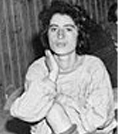 |

|
Transcript
"All
I remember is just being on my own, walking out
of that station and walking through Prague on
my own. I remember that, and just realising that…
it was all somehow different, very different.
A lot of Russian soldiers, and a lot of strangers
all of a sudden. And, of course the first thing
I did was to go back to where I used to live.
I don't know what I was expecting, but obviously
there was no one there because I knew they were
all dead. And then I went back to where we lived
last, and I went there because we were friends
with a concierge there, and she said we can hide
all our belongings in the cellar, and we had carpets
and china and, you know, valuable things, and
furniture. And when I came back and I asked about
those things she said the Germans came and took
it all. But I saw some of the things in her flat.
But I was too inexperienced in those things to
do anything about it, so I just left and never
went back there, but… I had a very low opinion
of that. Of course if it was now I would say something;
I would say this is mine, and this is mine, but
I was too young I think to know how to cope with
it. I know I spent a few nights at the hostel,
roaming around Prague you know, and just feeling
desperately lonely, because I suddenly realised
there's nobody there.
I
went… there was an office in Prague where
you had lists and lists of people who came back;
I don't know if it was in alphabetical order maybe,
or dates when they came back, but you could check
if you knew anybody who came back. And I went
to see these lists every day, hoping somebody
would came back I knew, but none of the family
came back at all. And I went for days and days,
actually for weeks afterwards, to see if anybody
would come back, but they didn't. So I just remember
walking around Prague being absolutely devastated,
feeling that you know, I was alone in the world,
that… I didn't know anybody, just didn't
know anybody. It was really I think the worst
time of the war. Although we were free and liberated,
it was the very worst time because we realised,
or I realised that nobody was going to come back,
and that life is never going to be the same, and
what I hoped for would happen after the war is
never going to happen. The hope was gone. Because
until then one had hope, that there would be a
small group of people one knew, some relative,
some friends, and one would start life again in
a community; get married, have children, and…
you know, carry on. But there was absolutely nobody
there whom I knew. I was seventeen."
|
 |
 |
 |